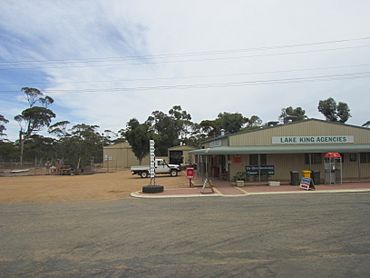Lake King, Western Australia facts for kids
Quick facts for kids Lake KingWestern Australia |
|
|---|---|

Lake King Agencies, 2015
|
|
| Established | 1936 |
| Postcode(s) | 6356 |
| Elevation | 344 m (1,129 ft) |
| Area | [convert: needs a number] |
| Location |
|
| LGA(s) | Shire of Lake Grace |
| State electorate(s) | Roe |
| Federal Division(s) | O'Connor |
Lake King is a small town in the eastern part of Western Australia. It's located in a farming area known as the Wheatbelt region. The town is about 464 kilometers (288 miles) southeast of Perth, the capital city.
In 2016, Lake King had a population of 95 people. If you include the nearby areas, the population was 332 in 2011. The town is found along State Route 40, between the towns of Ravensthorpe and Newdegate.
Contents
How Lake King Got Its Name
Lake King is named after a large lake nearby. This lake was named by Marshall Fox, a local surveyor. He chose the name to honor Henry Sandford King. Henry King was the Surveyor General of Western Australia at the time. A Surveyor General is a very important person who oversees all land surveys and mapping for a region.
The Story of Lake King
Early Planning and Settlement
In 1926, experts looked at the land around Lake King. They found that a huge area, about 230,000 acres, was good for farming and people to settle. After this, a group of important officials visited the area. This group included the Surveyor General, John Percy Camm. It also had members of the state government, like Sydney Stubbs and Edwin Wilkie Corboy. James Cornell, a member of the state's upper house, also joined them.
In 1927, the land was properly measured and mapped. New roads were built to make it easier to get around. In 1928, the land was made available for people to buy. It was sold at prices ranging from 4 shillings and 6 pence to 16 shillings per acre.
Growing Through Challenges
The town faced tough times during the Great Depression. This was a period in the 1930s when many people lost their jobs and money. However, Lake King managed to survive. After World War II ended, the town really started to grow. This was because the prices for wool and wheat, which are important farm products, became very high.
In 1935, a local group called the Lake King Progress Association asked the government to officially declare Lake King a town. This meant it would be recognized as a proper settlement. The government agreed, and Lake King was officially made a town in 1936.
What Happens in Lake King
The land around Lake King is mainly used for farming. Farmers in this area grow wheat and other cereal crops. Cereal crops are grains like barley, oats, and corn.
Lake King is also an important place for farmers to deliver their crops. It has a special site where Cooperative Bulk Handling collects grain. This company helps store and transport the crops grown by local farmers.
 | May Edward Chinn |
 | Rebecca Cole |
 | Alexa Canady |
 | Dorothy Lavinia Brown |


